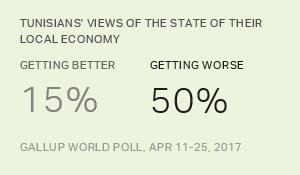Story Highlights
- 72% in Tunisia said in 2020 that their local economy was getting worse
- 80% of Tunisians said it was a bad time to find a job in their local area
- More Tunisians are out of work, earning less because of COVID-19
WASHINGTON, D.C. -- Tunisia's Jasmine Revolution 10 years ago was one of the quickest and relatively most peaceful revolutions that beset the Arab world at that time. Longtime Tunisian President Zine El Abidine Ben Ali resigned about a month after the protests started.
However, many of the economic problems that drove people to the streets a decade ago still remain. In many ways, they are even worse today, which helps explain why Tunisians are returning to the streets again in 2021. In 2020, eight in 10 Tunisians said it was a bad time to find a job in the city or area where they live -- up from 53% in 2010 before the revolution began.
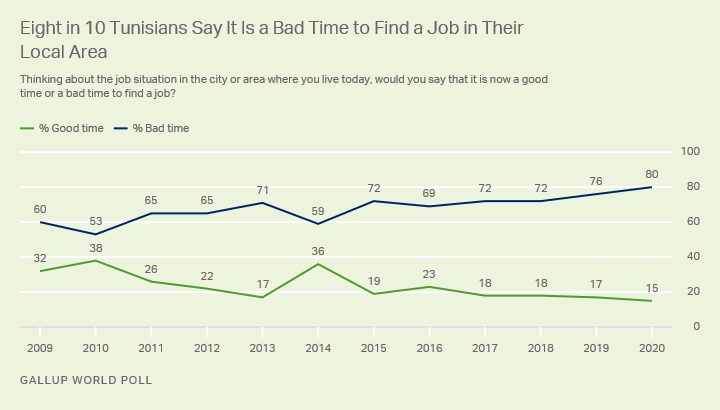
Line graph. Tunisians' assessments of whether or not it is a good time to find a job in their local areas. In 2020, 80% of Tunisians said it was a bad time to find a job, while 15% said it was a good time.
While some of the recent pessimism about the job market is likely related to lockdown measures implemented by the Tunisian government because of COVID-19, the percentage of Tunisians saying it was a bad time to find a job had already climbed to 76% by 2019. In fact, roughly seven in 10 Tunisians have said so since 2015, suggesting that much of the current economic pain predated the pandemic.
Regarding the broader question of the trajectory of their local economy, Tunisians in 2020 were nine times more likely than they were in 2010 to say economic conditions were getting worse (72% vs. 8%, respectively). As with assessments of the local job market, it is likely that COVID-19-related developments played a part in this pessimism. However, in 2019, 62% of Tunisians said their local economy was getting worse, which at the time was a new high.
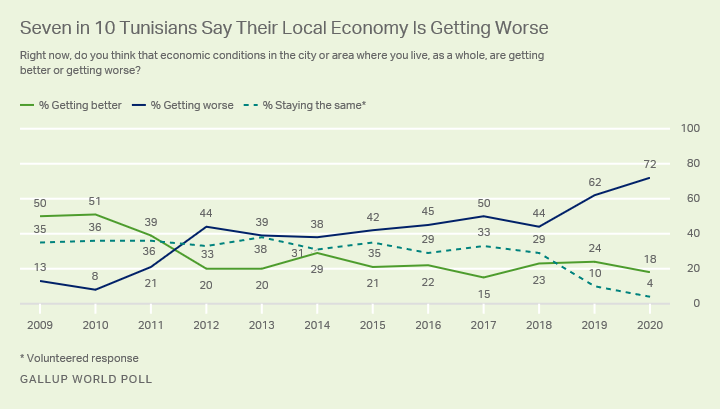
Line graph. Tunisians' assessments of the trajectory of their local economies. In 2020, 72% of Tunisians said their local economies were getting worse, 18% reported it was getting worse and 4% said it stayed the same.
Tunisians' Living Standards Also Suffering
Forty percent of Tunisians said in 2020 that their standard of living was getting worse, up from 7% who said the same in 2010, before the revolution. The percentage of Tunisians saying their standard of living was getting worse has generally trended upward since 2010, peaking at 42% in 2019, before the pandemic.
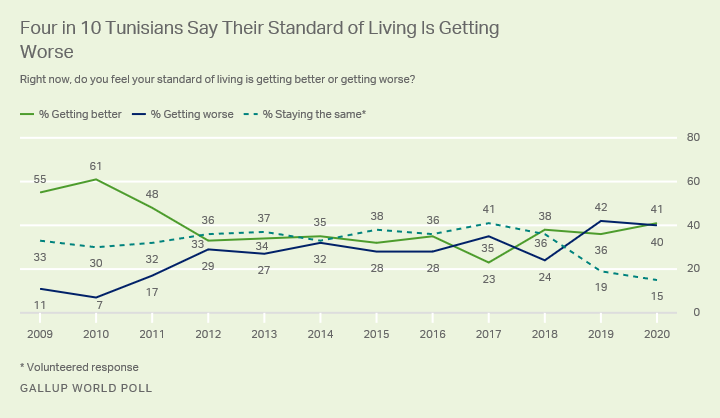
Line graph. Tunisians' assessments of whether their standards of living are getting better or worse. In 2020, 41% of Tunisians said their standards of living were getting worse, 40% reported they were getting better and 15% said they were staying the same.
At the same time, the percentage saying their standard of living was improving dropped 20 percentage points from 2010. The 61% saying so a decade ago was the highest point in Gallup's trend, though the 41% saying so in 2020 was well off the low of 23% in 2017. That low occurred after the approval of substantial austerity measures in the Tunisian government's budget.
Percentages Struggling to Afford Food, Shelter Triple Since Revolution
In addition to more Tunisians reporting declining standards of living a decade after the revolution, substantially more reported struggling to afford the basics. In 2020, four in 10 Tunisians said there were times in the past 12 months that they could not afford the food they needed, three times higher than the 13% who said so in 2010. This 40% is the highest level in Gallup's trend, topping the previous high of 34% in 2019.
Additionally, 31% of Tunisians reported being unable to afford adequate shelter within the past 12 months, up from 9% in 2010. The 31% saying so in 2020 was unchanged from the previous year.
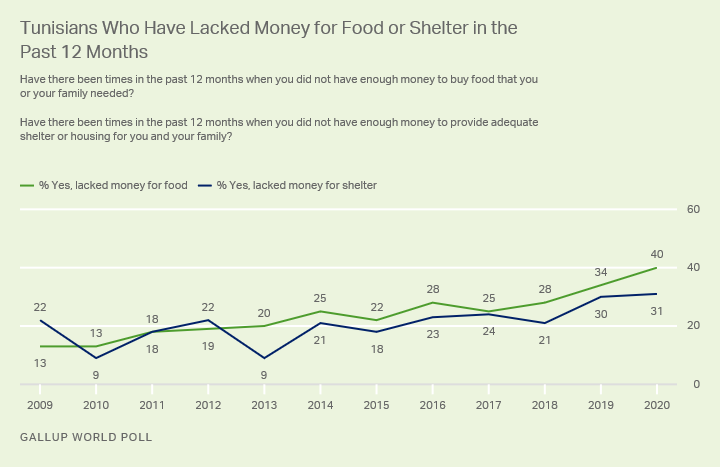
Line Graph. The percentages of Tunisians who report having lacked money for food or shelter in the last 12 months. In 2020, 40% of Tunisians reported having lacked money for food, while 31% said they lacked money for shelter.
More Tunisians Out of Work, Earning Less Because of COVID-19
Tunisians were already experiencing substantial levels of economic pain before the COVID-19 pandemic, which has only served to make it hurt more. Last fall, more than four in 10 Tunisians reported having temporarily stopped working at a job because of the pandemic, while nearly one in five said they had lost a job or business as a result of the situation. Additionally, 36% reported having worked fewer hours and 33% said they received less money from their employer.
| Yes | No | Does not apply/ No job |
|||||||||||||||||||||||||||||||||||||||||||||||||||||||||||||||||||||||||||||||||||||||||||||||||
|---|---|---|---|---|---|---|---|---|---|---|---|---|---|---|---|---|---|---|---|---|---|---|---|---|---|---|---|---|---|---|---|---|---|---|---|---|---|---|---|---|---|---|---|---|---|---|---|---|---|---|---|---|---|---|---|---|---|---|---|---|---|---|---|---|---|---|---|---|---|---|---|---|---|---|---|---|---|---|---|---|---|---|---|---|---|---|---|---|---|---|---|---|---|---|---|---|---|---|---|
| % | % | % | |||||||||||||||||||||||||||||||||||||||||||||||||||||||||||||||||||||||||||||||||||||||||||||||||
| Temporarily stopped working at job or business as a result of coronavirus situation | 43 | 27 | 29 | ||||||||||||||||||||||||||||||||||||||||||||||||||||||||||||||||||||||||||||||||||||||||||||||||
| Lost job or business as a result of coronavirus situation | 19 | 50 | 30 | ||||||||||||||||||||||||||||||||||||||||||||||||||||||||||||||||||||||||||||||||||||||||||||||||
| Worked fewer hours at job or business as a result of coronavirus situation | 36 | 33 | 31 | ||||||||||||||||||||||||||||||||||||||||||||||||||||||||||||||||||||||||||||||||||||||||||||||||
| Received less money than usual from employer or business as a result of coronavirus situation | 33 | 37 | 30 | ||||||||||||||||||||||||||||||||||||||||||||||||||||||||||||||||||||||||||||||||||||||||||||||||
| Gallup World Poll, 2020 | |||||||||||||||||||||||||||||||||||||||||||||||||||||||||||||||||||||||||||||||||||||||||||||||||||
Bottom Line
Tunisians had high hopes for change coming out of their revolution in 2011. However, their hopes have largely remained just that. By Gallup's measure, Tunisians reported being substantially worse off economically in 2020 than they were in 2010.
The COVID-19 pandemic has clearly made a poor economic situation worse, further increasing the difficulties the country's government will have in delivering on long-held hopes for prosperity. These difficulties are only likely to get tougher in the days ahead. Late last month, the International Monetary Fund warned of an "unprecedented economic downturn" in the country. The body recommended limiting energy subsidies and lowering the wage bill.
For complete methodology and specific survey dates, please review Gallup's Country Data Set details.
Learn more about how the Gallup World Poll works.


